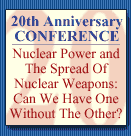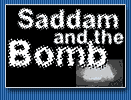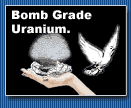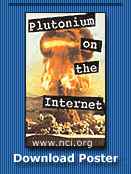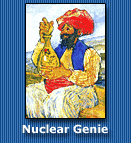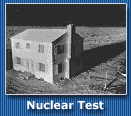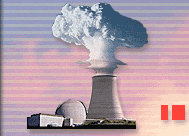| |
 Nonessential Nukes
(Dr. Edwin Lyman, NCI
President, and Paul Leventhal, NCI President Emeritus, Washington Post,
November 26, 2002)
Nonessential Nukes
(Dr. Edwin Lyman, NCI
President, and Paul Leventhal, NCI President Emeritus, Washington Post,
November 26, 2002)
..............................................................................
 NCI, Groups to Congress:
Eliminate Support for Reprocessing from Energy Bill
(Letter from NCI and 33 Public-Interest
Groups to Energy Bill Conferees, October, 2002)
NCI, Groups to Congress:
Eliminate Support for Reprocessing from Energy Bill
(Letter from NCI and 33 Public-Interest
Groups to Energy Bill Conferees, October, 2002)
..............................................................................
 NCI Comments on NRC's Revised Draft EIS for MOX Fuel Fabrication Plant
(Dr. Edwin Lyman, NCI President, Letter to Nuclear Regulatory Commission,
August 30, 2002)
NCI Comments on NRC's Revised Draft EIS for MOX Fuel Fabrication Plant
(Dr. Edwin Lyman, NCI President, Letter to Nuclear Regulatory Commission,
August 30, 2002)
..............................................................................
 Safeguards Concerns About Proposed U.S. Plutonium Fuel Plant (Dr.
Edwin Lyman, NCI President, Presentation at the 43rd Annual Meeting
of the Institute of Nuclear Materials Management (INMM), Orlando, Florida,
June 24, 2002)
Safeguards Concerns About Proposed U.S. Plutonium Fuel Plant (Dr.
Edwin Lyman, NCI President, Presentation at the 43rd Annual Meeting
of the Institute of Nuclear Materials Management (INMM), Orlando, Florida,
June 24, 2002)
..............................................................................
 G-8 Nations to Waste Billions on Russian Plutonium Fuel (NCI Press
Release, June 27, 2002)
G-8 Nations to Waste Billions on Russian Plutonium Fuel (NCI Press
Release, June 27, 2002)
..............................................................................
 U.S.-Russia Nuclear Agreement Does Not Eliminate Warheads or Provide for
Effective Plutonium Disposal (NCI Press Release,
May 14, 2002)
U.S.-Russia Nuclear Agreement Does Not Eliminate Warheads or Provide for
Effective Plutonium Disposal (NCI Press Release,
May 14, 2002)
..............................................................................
 NRC to NCI: Revised MOX
Environmental Impact Statement Is Warranted (April
26, 2002)
NRC to NCI: Revised MOX
Environmental Impact Statement Is Warranted (April
26, 2002)
Additional required information for MOX fuel plant is consistent with what NCI
is demanding of DOE, NRC says
Federal Register Notice (PDF
format)
..............................................................................
 DOE Officially Abandons Direct
Disposal of Military Plutonium Without Conducting Environmental Review
(April 19, 2002)
DOE Officially Abandons Direct
Disposal of Military Plutonium Without Conducting Environmental Review
(April 19, 2002)
 NCI
Press Release NCI
Press Release
 DOE
Federal Register Notice
(PDF format) DOE
Federal Register Notice
(PDF format)
 NCI
Condemns DOE Decision to Ship Plutonium to Savannah River over South
Carolina's Opposition (NCI Press Release,
April 16, 2002) NCI
Condemns DOE Decision to Ship Plutonium to Savannah River over South
Carolina's Opposition (NCI Press Release,
April 16, 2002)
..............................................................................
 Japan Can Construct Nuclear Weapons Using Its Power
Plant Plutonium (April 9)
Japan Can Construct Nuclear Weapons Using Its Power
Plant Plutonium (April 9)
Opposition leader Ozawa's statement is technically accurate, politically
dangerous, says NCI
News Articles
..............................................................................
 “Japan,
Nuclear Weapons and Reactor-Grade Plutonium” (March 27)
“Japan,
Nuclear Weapons and Reactor-Grade Plutonium” (March 27)
Marvin Miller of MIT tells NCI seminar that Japanese scientists could use
reactor-grade plutonium to make sophisticated weapons
..............................................................................
 NCI to Energy Secretary Abraham: Make Sure Disposal of
U.S. and Russian Plutonium Proceeds at Same Pace
NCI to Energy Secretary Abraham: Make Sure Disposal of
U.S. and Russian Plutonium Proceeds at Same Pace
 NCI
Press Release (March 27, 2002) NCI
Press Release (March 27, 2002)
 DOE
Reply to NCI (May 17, 2002) DOE
Reply to NCI (May 17, 2002)
..............................................................................
 NCI Press Release:
DOE Report Reveals New Plutonium Disposition Hurdles
(Feb. 25)
NCI Press Release:
DOE Report Reveals New Plutonium Disposition Hurdles
(Feb. 25)
..............................................................................
 NCI Memo: The “Revised” Plutonium Disposition Strategy: DOE’s “House Of Cards”
(Feb. 22)
NCI Memo: The “Revised” Plutonium Disposition Strategy: DOE’s “House Of Cards”
(Feb. 22)
..............................................................................
 DOE Report to Congress:
Disposition of Surplus Defense Plutonium at Savannah River Site
(Feb.
8;
PDF file, 340kb)
DOE Report to Congress:
Disposition of Surplus Defense Plutonium at Savannah River Site
(Feb.
8;
PDF file, 340kb)
Plutonium in Your Neighborhood?
DOE is now looking for at
least two more reactors to burn plutonium fuel.
..............................................................................
 Intelligence Report (NIC) to Congress
Intelligence Report (NIC) to Congress
Safety and Security of Russian Nuclear Facilities & Military Forces
(Feb. 2002)
..............................................................................
 NCI letter to Secretary of Energy Abraham
NCI letter to Secretary of Energy Abraham
Request for "Supplemental Environmental Impact Statement" (SEIS) on Plutonium
Disposition (Feb.
8)
..............................................................................
 NCI letter to DOE's General Gordon (NNSA Administrator)
Supplemental EIS Legally Mandated Due to "Substantial Changes" in Plutonium
Disposition Program (March 2002)
NCI letter to DOE's General Gordon (NNSA Administrator)
Supplemental EIS Legally Mandated Due to "Substantial Changes" in Plutonium
Disposition Program (March 2002)
..............................................................................
 DOE "Supplement Analysis"
on Plutonium Storage in K-Reactor at the Savannah River Site Reveals Plan for
Indefinite Plutonium Storage in S. Carolina (Feb.
2002)
DOE "Supplement Analysis"
on Plutonium Storage in K-Reactor at the Savannah River Site Reveals Plan for
Indefinite Plutonium Storage in S. Carolina (Feb.
2002)
..............................................................................
 NCI Press Release
NCI Press Release
U.S. Plan to Use Bomb Plutonium as Nuclear Fuel Faces Enormous Legal, Economic
and Safety Hurdles
(Jan. 23, 2002)
 U.S. Settles on Plan to Recycle Plutonium
U.S. Settles on Plan to Recycle Plutonium
New York Times
(Jan. 23, 2002)
 DOE Press Release
(Jan. 23, 2002)
DOE Press Release
(Jan. 23, 2002)
..............................................................................
 “Past, Present and Future”
“Past, Present and Future”
Nuclear Engineering International publishes guest article by NCI President
Paul Leventhal on how civilian plutonium could cause mass destruction across
the nuclear industry and the world.
..............................................................................
 NCI Press Release
NCI Press Release
Closure of DOE's Fast Flux Test Facility is a Long-Overdue Death Sentence for
U.S. Plutonium Breeder Reactor Program
(Dec. 20, 2001)
..............................................................................
 DOE News Release
DOE News Release
Department of Energy to Permanently Deactivate Fast Flux Test Facility
Research Reactor (Dec. 19)
..............................................................................
 NCI Press Release:
U.S. MOX Plant Challenge Accepted by NRC Licensing Board
(Dec. 13)
NCI Press Release:
U.S. MOX Plant Challenge Accepted by NRC Licensing Board
(Dec. 13)
..............................................................................
 NCI Press Release:
DOE Agrees to Conduct Threat Assessment on Plutonium Fuel (MOX) Shipment from
Japan to BNFL's Sellafield Site (Nov.
16)
NCI Press Release:
DOE Agrees to Conduct Threat Assessment on Plutonium Fuel (MOX) Shipment from
Japan to BNFL's Sellafield Site (Nov.
16)
..............................................................................
 NCI Press Release:
U.S. Must Assess Security Threat Before Deciding on Shipment of Plutonium Fuel
(MOX) from Japan to England (Nov. 14)
NCI Press Release:
U.S. Must Assess Security Threat Before Deciding on Shipment of Plutonium Fuel
(MOX) from Japan to England (Nov. 14)
..............................................................................
 NCI Press Release:
U.S. Must Assess Security Threat Before Deciding on Shipment of Plutonium Fuel
(MOX) from Japan to England (Nov. 14)
NCI Press Release:
U.S. Must Assess Security Threat Before Deciding on Shipment of Plutonium Fuel
(MOX) from Japan to England (Nov. 14)
..............................................................................
 NCI Letter:
Review of MOX Shipment from Japan to Great Britain
(Oct. 25)
NCI Letter:
Review of MOX Shipment from Japan to Great Britain
(Oct. 25)
..............................................................................
 NCI Letter:
A Summit Topic: Russia's Plutonium
(Paul L. Leventhal, NCI President, letter
to the editor, New York Times Nov. 13)
NCI Letter:
A Summit Topic: Russia's Plutonium
(Paul L. Leventhal, NCI President, letter
to the editor, New York Times Nov. 13)
..............................................................................
 Congress
Urged To Restore Full Funding To Dispose Of Surplus Weapons Plutonium As Waste
(August
30, 2001)
Congress
Urged To Restore Full Funding To Dispose Of Surplus Weapons Plutonium As Waste
(August
30, 2001)
..............................................................................
 The
Future of Immobilization Under the U.S.-Russian Plutonium
Disposition Agreement
The
Future of Immobilization Under the U.S.-Russian Plutonium
Disposition Agreement
(Dr. Edwin Lyman, NCI
Scientific Director, Paper Presented at the 42nd Annual
Meeting of the Institute of Nuclear Materials Management,
Indian Wells, CA, July 18, 2001)
..............................................................................
 Japanese Village Sends Loud Message On Plutonium That Bush and Cheney Would Do Well To Hear (NCI press release, May 27, 2001) Japanese Village Sends Loud Message On Plutonium That Bush and Cheney Would Do Well To Hear (NCI press release, May 27, 2001)
..............................................................................
 Bush Plan for Nuclear Power and Plutonium Invites Nuclear Accidents and Proliferation (Statement by Paul Leventhal, NCI President, Bush Plan for Nuclear Power and Plutonium Invites Nuclear Accidents and Proliferation (Statement by Paul Leventhal, NCI President,
May 17, 2001)
..............................................................................
 More Nuclear Power Means More Risk More Nuclear Power Means More Risk
(Paul Leventhal, NCI President, op-ed column,
New York Times, May 17, 2001)
..............................................................................
 Research on Accelerator Transmutation of Waste and Pyroprocessing is a Colossal Waste of Taxpayer Money
(Dr. Edwin Lyman, NCI Scientific Director, May 24, 2001) Research on Accelerator Transmutation of Waste and Pyroprocessing is a Colossal Waste of Taxpayer Money
(Dr. Edwin Lyman, NCI Scientific Director, May 24, 2001)
..............................................................................
 Nuclear Control Institute Comments for Sellafield Mixed-Oxide Fuel Plant (SMP) Consultation
(Steven Dolley, NCI Research Director, and Paul Leventhal, NCI President, Nuclear Control Institute Comments for Sellafield Mixed-Oxide Fuel Plant (SMP) Consultation
(Steven Dolley, NCI Research Director, and Paul Leventhal, NCI President,
May 23, 2001)
..............................................................................
 Nuclear Control Institute Comments on the Scope and Content of the Nuclear Regulatory Commission Environmental Impact Statement for the Mixed Oxide Fuel Fabrication Facility Nuclear Control Institute Comments on the Scope and Content of the Nuclear Regulatory Commission Environmental Impact Statement for the Mixed Oxide Fuel Fabrication Facility
(Dr. Edwin Lyman, NCI Scientific Director,
May 21, 2000)
..............................................................................
 The Future of Nuclear Power: A Public Interest Perspective
(Dr. Edwin Lyman, NCI Scientific Director, Presentation to the NECPUC Symposium, Mystic, Connecticut, May 21, 2001) The Future of Nuclear Power: A Public Interest Perspective
(Dr. Edwin Lyman, NCI Scientific Director, Presentation to the NECPUC Symposium, Mystic, Connecticut, May 21, 2001)
..............................................................................
 Cheney: "Reprocessing...needs to be looked at" (Excerpt from NBC "Meet the Press" interview with Vice President Dick Cheney, May 20, 2001) Cheney: "Reprocessing...needs to be looked at" (Excerpt from NBC "Meet the Press" interview with Vice President Dick Cheney, May 20, 2001)
..............................................................................
 Nuclear Control Institute Calls on Nuclear Industry to Abandon Use of Plutonium, Highly Enriched Uranium Nuclear Control Institute Calls on Nuclear Industry to Abandon Use of Plutonium, Highly Enriched Uranium
(NCI Press Release, April 9, 2001)
..............................................................................
 NCI, IEER: NRC Should Hold Formal Hearings on Duke Cogema Stone Webster Application for Authorization to Construct a MOX Fuel Fabrication Facility
(Nuclear Control Institute and Institute for Energy & Environmental Research, Letter to the U.S. Nuclear Regulatory Commission, March 9, 2001) NCI, IEER: NRC Should Hold Formal Hearings on Duke Cogema Stone Webster Application for Authorization to Construct a MOX Fuel Fabrication Facility
(Nuclear Control Institute and Institute for Energy & Environmental Research, Letter to the U.S. Nuclear Regulatory Commission, March 9, 2001)
..............................................................................
 NCI, NGOs to CNSC: Suspend Plans to Test Warhead-Plutonium MOX Fuel for CANDU Reactors (Letter from NCI, BREDL and 19 other public-interest groups to Canadian Nuclear Safety Commission, January 23, 2001) NCI, NGOs to CNSC: Suspend Plans to Test Warhead-Plutonium MOX Fuel for CANDU Reactors (Letter from NCI, BREDL and 19 other public-interest groups to Canadian Nuclear Safety Commission, January 23, 2001)
..............................................................................
 Nuclear Control Institute Comments on the Scope and Content of the Nuclear Regulatory Commission Environmental Impact Statement for the Mixed Oxide Fuel Fabrication Facility Nuclear Control Institute Comments on the Scope and Content of the Nuclear Regulatory Commission Environmental Impact Statement for the Mixed Oxide Fuel Fabrication Facility
(Dr. Edwin Lyman, NCI Scientific Director,
May 21, 2000)
..............................................................................
 The Future of Nuclear Power: A Public Interest Perspective
(Dr. Edwin Lyman, NCI Scientific Director, Presentation to the NECPUC Symposium, Mystic, Connecticut, May 21, 2001) The Future of Nuclear Power: A Public Interest Perspective
(Dr. Edwin Lyman, NCI Scientific Director, Presentation to the NECPUC Symposium, Mystic, Connecticut, May 21, 2001)
..............................................................................
 Cheney: "Reprocessing...needs to be looked at" (Excerpt from NBC "Meet the Press" interview with Vice President Dick Cheney, May 20, 2001) Cheney: "Reprocessing...needs to be looked at" (Excerpt from NBC "Meet the Press" interview with Vice President Dick Cheney, May 20, 2001)
..............................................................................
 Nuclear Control Institute Calls on Nuclear Industry to Abandon Use of Plutonium, Highly Enriched Uranium Nuclear Control Institute Calls on Nuclear Industry to Abandon Use of Plutonium, Highly Enriched Uranium
(NCI Press Release, April 9, 2001)
..............................................................................
 NCI, IEER: NRC Should Hold Formal Hearings on Duke Cogema Stone Webster Application for Authorization to Construct a MOX Fuel Fabrication Facility
(Nuclear Control Institute and Institute for Energy & Environmental Research, Letter to the U.S. Nuclear Regulatory Commission, March 9, 2001) NCI, IEER: NRC Should Hold Formal Hearings on Duke Cogema Stone Webster Application for Authorization to Construct a MOX Fuel Fabrication Facility
(Nuclear Control Institute and Institute for Energy & Environmental Research, Letter to the U.S. Nuclear Regulatory Commission, March 9, 2001)
..............................................................................
 NCI, NGOs to CNSC: Suspend Plans to Test Warhead-Plutonium MOX Fuel for CANDU Reactors (Letter from NCI, BREDL and 19 other public-interest groups to Canadian Nuclear Safety Commission, January 23, 2001) NCI, NGOs to CNSC: Suspend Plans to Test Warhead-Plutonium MOX Fuel for CANDU Reactors (Letter from NCI, BREDL and 19 other public-interest groups to Canadian Nuclear Safety Commission, January 23, 2001)
..............................................................................
 IAEA Safeguards Shortcomings: A Critique
IAEA Safeguards Shortcomings: A Critique
Paul Leventhal (September 12, 1994)
..............................................................................
 Are IAEA Safeguards on Plutonium Bulk-Handling
Facilities Effective?
Are IAEA Safeguards on Plutonium Bulk-Handling
Facilities Effective?
(Marvin Miller, MIT, August 1990)
|

